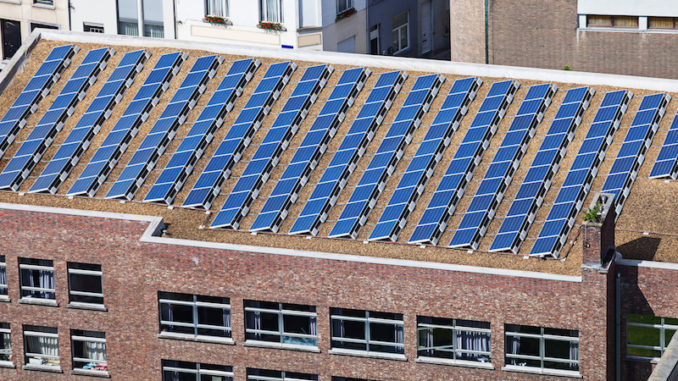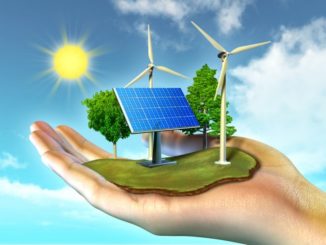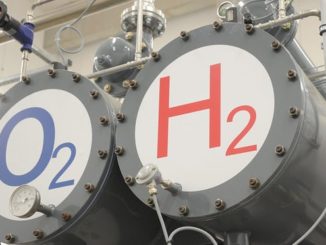
Published on 06/12/2017, 3:36pm
While any move away from fossil fuels is welcome, we need to think bigger about what resilience could mean for Puerto Rico

A commons-based solar network that provides income to communities is not a new idea (Photo: Deposit Photos By Elsie Bryant)
Hurricane Maria, which made landfall at the end of September, left the island of Puerto Rico without energy, as more than three-quarters of its energy infrastructure was lost to the storm.
As Puerto Ricans sought help in restoring power to the people, for green energy enthusiasts, the destruction of Hurricane Maria was an opportunity to rethink – not just rebuild – Puerto Rico’s energy infrastructure by going off-grid with solar energy.
“Puerto Rico has a once in a lifetime opportunity to rethink how it gets electricity”, wrote Earther journalist, Brian Kahn; “Solar industry wants to build Puerto Rico’s grid of the future” was the Bloomberg headline. Even the energy and environment minister for the Maldives, Thoriq Ibrahim, weighed in: “Puerto Rico hurricane shows islands must have renewable energy,” he wrote. Elon Musk has been one of the more prominent players in the space, with his company Tesla offering solar systems and batteries.
While any move away from fossil fuels is welcome, we need to think bigger about what resilience could mean for Puerto Rico. There’s an even larger opportunity here to transform Puerto Rico, where before the natural disaster happened, an economic and social crisis has been playing out for nearly a decade.
Puerto Rico’s economy has been in recession for over 10 years, the population is in drastic decline and the household income is less than half of what it is in the poorest US state. All the while, the island’s debt burden continues to grow, making private firms very rich. A resilient Puerto Rico needs not just a new grid but a new economic system, one that is localised and community driven, with Puerto Ricans owning and managing those resources.
UN secretary general: Hurricane devastation linked to climate change
This is not a vision that Puerto Ricans are waiting for the wider world to bring to them. Ángel Figueroa Jaramillo, head of Utier, the electrical workers’ union in Puerto Rico, told reporters “solar power and wind power in Puerto Rico is really the key to the future of the island’s energy independence”, adding that “all the alternatives have to be owned by the community”.
The benefits of community ownership are clear when the evidence shows that some of the most resilient communities following the hurricane were cooperatives such as the Cooperativa de Vivienda Ciudad Universitaria. The co-op is a community of over 1000 people, who as the Orlando Sentinel reported, “learned to formalise the neighbour-to-neighbour mentality so well that in situations of crisis – such as this one – they don’t have to wait for the government to show up or feel the need to flee”.
Thinking even more radically, the gains of a commons-based solar network, could be extended by advocating that dividends from any energy sold back to the grid could be redistributed to every Puerto Rican as a basic income.
This is not a novel idea. Alaska’s Permanent Dividend Fund, where profits are given back as a dividend to every citizen, has been around since 1976 and is paid for by tax receipts from the oil industry. In a recent survey 50% of Alaskans in more difficult economic straits said the annual cheque “made a major difference in their lives and 79% of respondents said it’s is an important source of income for people in their community”. Public support for the programme has deepened in the last generation, despite the prospect of raising taxes.
So what would a locally-owned renewable energy source combined with a universal basic income do? Well for a start, it would break dependence on fossil fuels in a territory that to-date has been powered by oil, natural gas and imported coal. And, as evidence from universal basic income pilots around the world show, a basic income could tackle a whole range of issues, from transforming the systems that create poverty, inequality and climate change, to improving Puerto Rican’s health and even encouraging creativity.
It is difficult to provide figures on how much a community-owned solar energy network could generate in dividends. It would depend on many factors including the size of the system installed, energy capture from one community to the next, and the retail rate of utilities when being sold back to the grid.
How this could be financed is a discussion for the Puerto Rican people, their government and their foreign partners, particularly the US. But reconstruction will happen one way or another. There are examples of this being done in Australia, Saudi Arabia, India, the USA and the UK so there is no reason why it couldn’t be applied to Puerto Rico.
Environmentalists have led the energy conversation in Puerto Rico in a new direction, but solar infrastructure combined with a universal basic income could be a truly transformative, bottom-up approach, that puts power back in the hands of Puerto Ricans. Beyond simply replacing fossil fuels with renewables, it’s time to think in a joined-up way about the root causes of our environmental crisis – and that’s our global economic system.
Elsie Bryant is head of digital communications at The Rules.
Source:http://www.climatechangenews.com
Visits: 89



Thank you for sharing.